Text
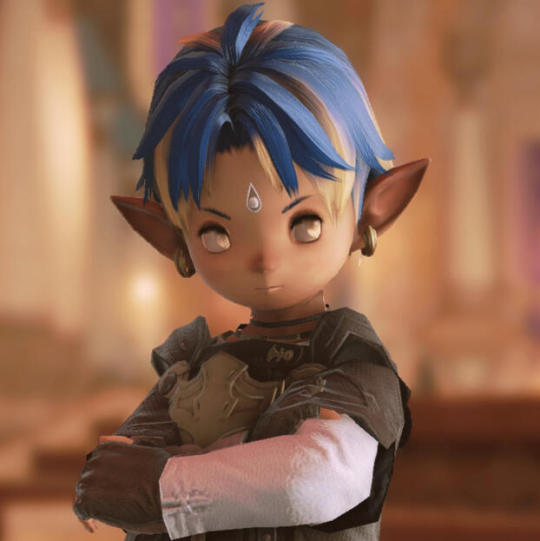

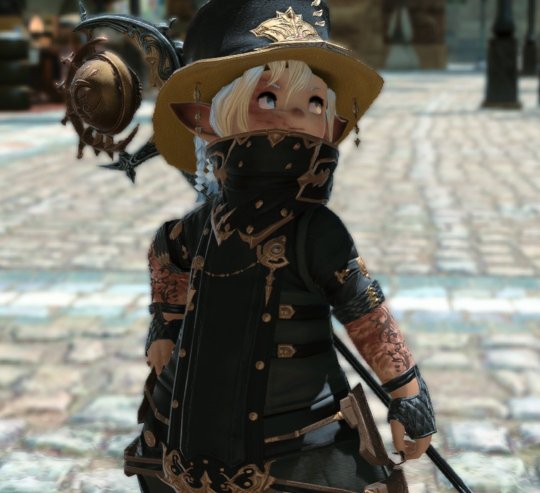

Gladiator (PRE-ARR) > Dark Knight (ARR - SHB) > Black Mage (EW) > Red Mage (DT) > White Mage (Post-DT)
#ffxiv#sasa#im so sad i cant figure out how to get his scars back... but im also partial to the idea of like#him finally healing emotionally and physically#and maybe having horns instead. as a treat.
0 notes
Text

Warrior of Darkness. Abyssal Wanderer.
361 notes
·
View notes
Text
As an appreciator of angst I like the times when the WoL's friends and allies worry for them: there's no doubt that the WoL can fight most anything and win, but that doesn't stop their loved ones from being concerned for their mental and emotional health, and there's an interesting flavor to that sort of drama. The scene I really want to talk about now though isn't about the WoL's friends.
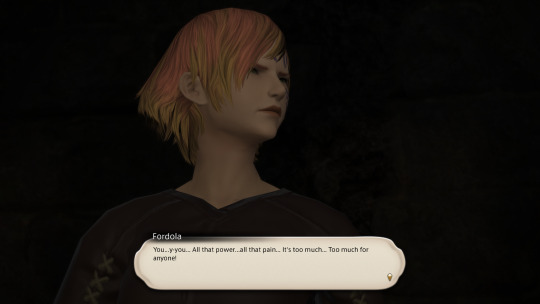
The scene being the one in the StB post-patches where Fordola has an Echo vision of the WoL's past and is, to put it simply, shaken by what she sees. Her horror at the WoL's past isn't because she's worried about them as a friend, far from it, she's basically still an enemy at this point. My brother has a good take that Fordola's false Echo acts as a sort of "forced empathy" for her - she has her ways of rationalizing and justifying the bad things she's done, feeling little for the people she hurts, until the Echo forces her to see and share in that pain. So she gets a moment of direct soul-to-soul communication with the WoL, not friend to friend but just human to human, and her reaction is shock, confusion, and a small amount of empathy too, because she felt their pain through the Echo.
No doubt it's a sobering moment for the WoL as well. Like her, like anyone else, they likely have their own ways of compartmentalizing, justifying, choosing the stories they tell themself about what they've done and what's been done to them. By Stormblood they've likely come to accept their way of life as what's normal for them - but then someone looks at their life and her reaction is basically "how have you not gone insane yet?". It's a jarring reminder that all that fighting and grieving and being used as a weapon is not normal or okay.
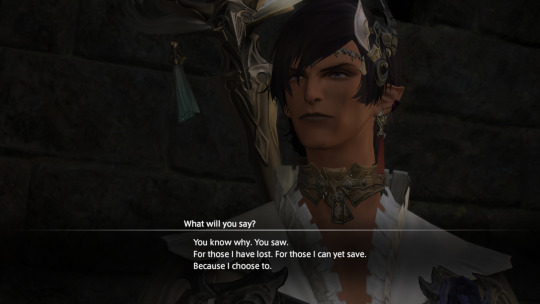
The dialogue options in response are all very characteristic of the WoL: simple and blunt, a little bit harsh - there's no quips here considering the gravity of the moment. There's also, notably, no "..." option that crops up often in other exchanges. You can't keep silence, in this moment you have to choose a reason to say why you're still standing, for your own sake as much as for the one asking.
(Also, I have heard that this exchange is a bit different in some of the other translations of the game, with more emphasis put on the Echo and how the WoL suffers from being exposed to other people's pain as opposed to just their own pain in the English version. I don't think either version is right or wrong, but I do like the rare times where the Echo is explored as something more than a plot device for giving plot-relevent flashbacks. The Echo is psychic empathy; the fact that they frequently get brain-blasted with other people's trauma plays a role in the WoL's heroism.)
494 notes
·
View notes
Text
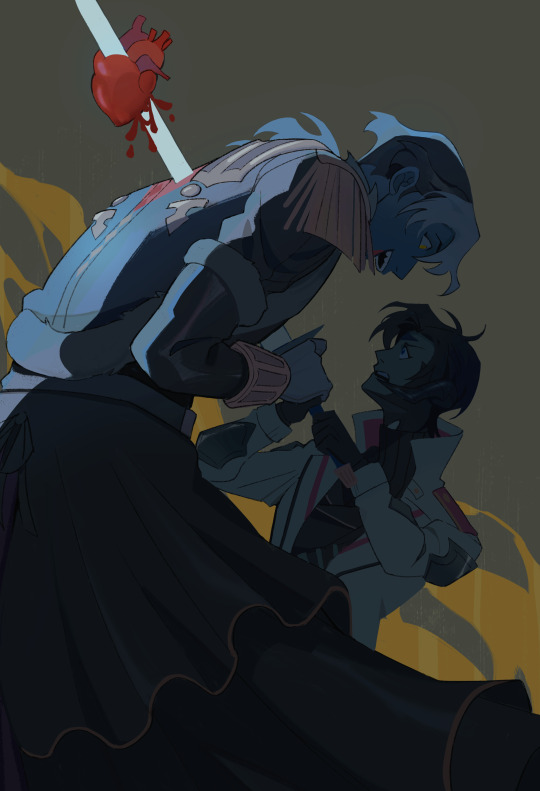
The hero had torn out the monster's heart, and yet he kept laughing, and laughing.
598 notes
·
View notes
Text
in my heart the way the WoL is frequently dehumanized (whether elevated to a hero or reduced to a living weapon), how much their friends and allies love them, all the shiptease with almost every major NPC, and Zenos's obsession with them as his "mirror" are all kind of the same thing, you feel me?
you can't choose how people love you, and being loved so intensely by so many people is sometimes a gift, sometimes a burden, sometimes a threat.
474 notes
·
View notes
Text
OP: popurlar northeast snake spirit and her fans
429 notes
·
View notes
Text
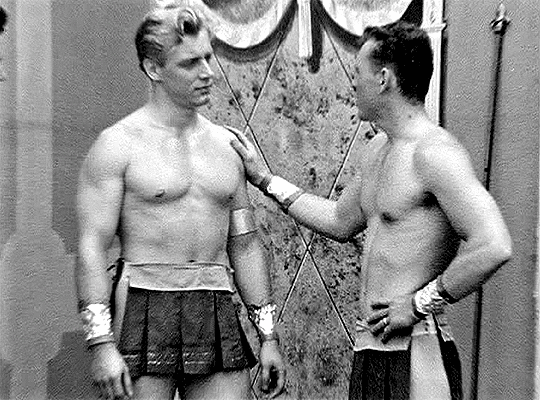
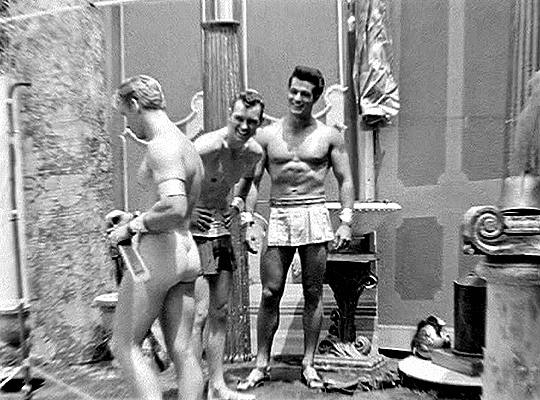
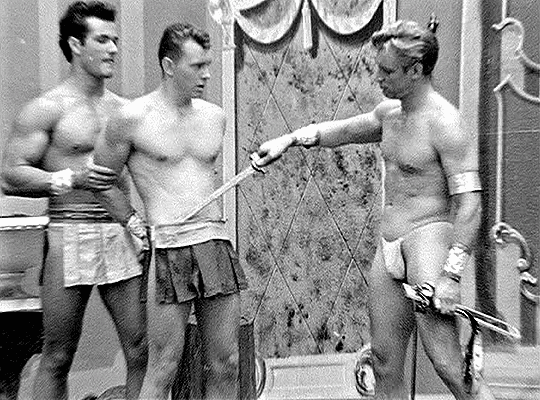
Alan Parker, Joe Leitel and Bruce Reed Ben-Hurry (1959) dir. Richard Fontaine
56K notes
·
View notes
Text

commission for @adxmanial, their character Laz! i fell in love with his design, thank you for trusting me with him 🤍🤎💙
8K notes
·
View notes
Text
literally crying laughing at this
34K notes
·
View notes
Text
baby i could treat you so good you just have to get past my strange and off-putting demeanor and my kubrick stare and my inability to behave like a human and the 40 layers of icy fortress walls i have up and answer my riddles three
11K notes
·
View notes
Text
i keep thinking about how most depictions of the power of prophecy only acknowledge the potential for abuse in insofar as accepting that people can lie and the existence of grifters (false prophets) when there's so much more potential to it
2K notes
·
View notes
Text
Blind people gesture (and why that’s kind of a big deal)
People who are blind from birth will gesture when they speak. I always like pointing out this fact when I teach classes on gesture, because it gives us an an interesting perspective on how we learn and use gestures. Until now I’ve mostly cited a 1998 paper from Jana Iverson and Susan Goldin-Meadow that analysed the gestures and speech of young blind people. Not only do blind people gesture, but the frequency and types of gestures they use does not appear to differ greatly from how sighted people gesture. If people learn gesture without ever seeing a gesture (and, most likely, never being shown), then there must be something about learning a language that means you get gestures as a bonus.
Blind people will even gesture when talking to other blind people, and sighted people will gesture when speaking on the phone - so we know that people don’t only gesture when they speak to someone who can see their gestures.
Earlier this year a new paper came out that adds to this story. Şeyda Özçalışkan, Ché Lucero and Susan Goldin-Meadow looked at the gestures of blind speakers of Turkish and English, to see if the *way* they gestured was different to sighted speakers of those languages. Some of the sighted speakers were blindfolded and others left able to see their conversation partner.
Turkish and English were chosen, because it has already been established that speakers of those languages consistently gesture differently when talking about videos of items moving. English speakers will be more likely to show the manner (e.g. ‘rolling’ or bouncing’) and trajectory (e.g. ‘left to right’, ‘downwards’) together in one gesture, and Turkish speakers will show these features as two separate gestures. This reflects the fact that English ‘roll down’ is one verbal clause, while in Turkish the equivalent would be yuvarlanarak iniyor, which translates as two verbs ‘rolling descending’.
Since we know that blind people do gesture, Özçalışkan’s team wanted to figure out if they gestured like other speakers of their language. Did the blind Turkish speakers separate the manner and trajectory of their gestures like their verbs? Did English speakers combine them? Of course, the standard methodology of showing videos wouldn’t work with blind participants, so the researchers built three dimensional models of events for people to feel before they discussed them.
The results showed that blind Turkish speakers gesture like their sighted counterparts, and the same for English speakers. All Turkish speakers gestured significantly differently from all English speakers, regardless of sightedness. This means that these particular gestural patterns are something that’s deeply linked to the grammatical properties of a language, and not something that we learn from looking at other speakers.
References
Jana M. Iverson & Susan Goldin-Meadow. 1998. Why people gesture when they speak. Nature, 396(6708), 228-228.
Şeyda Özçalışkan, Ché Lucero and Susan Goldin-Meadow. 2016. Is Seeing Gesture Necessary to Gesture Like a Native Speaker? Psychological Science, 27(5) 737–747.
Asli Ozyurek & Sotaro Kita. 1999. Expressing manner and path in English and Turkish: Differences in speech, gesture, and conceptualization. In Twenty-first Annual Conference of the Cognitive Science Society (pp. 507-512). Erlbaum.
86K notes
·
View notes
























